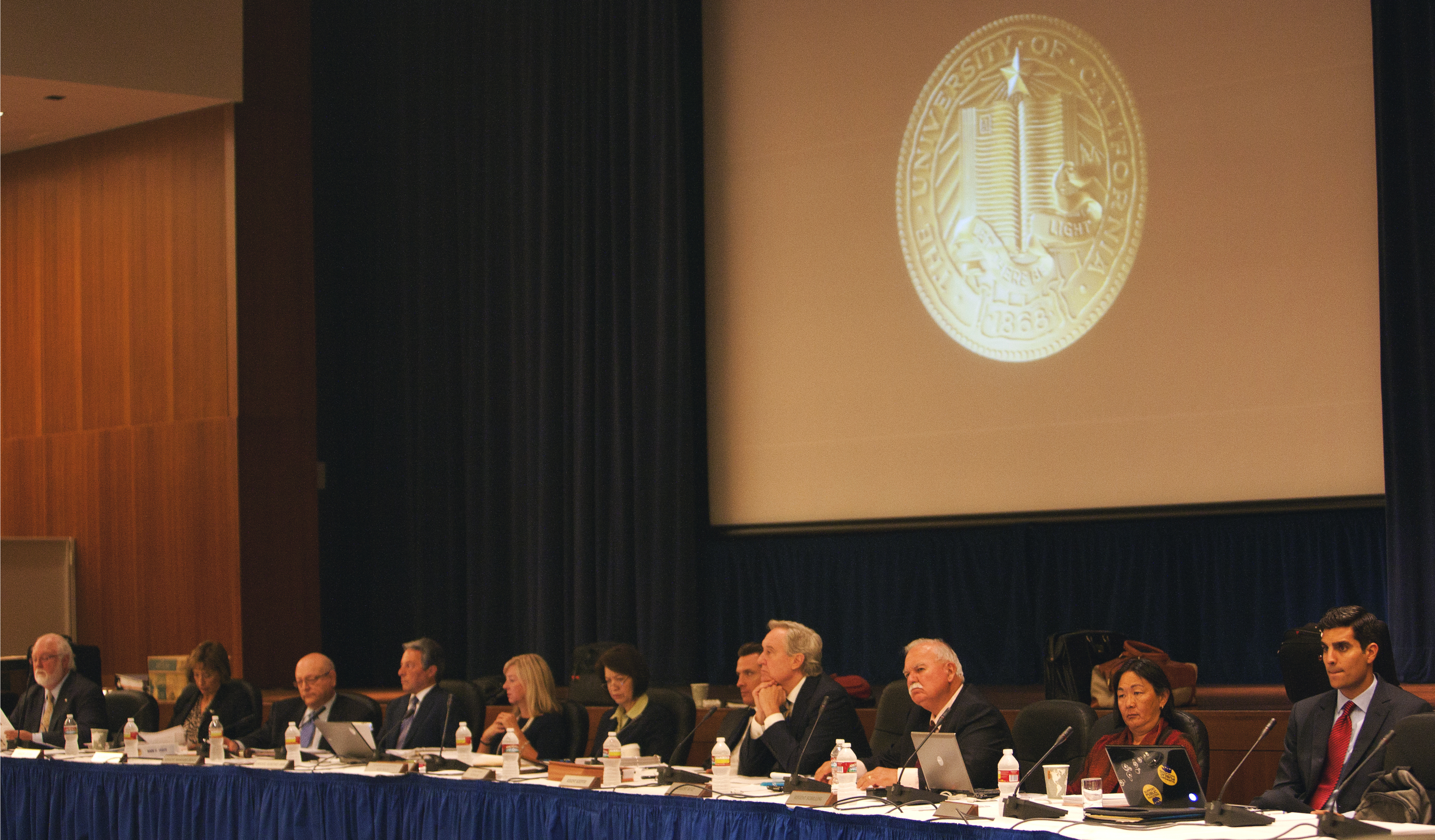SAN FRANCISCO “”mdash; The UC Board of Regents discussed possible solutions to alleviate the University of California’s financial problems at its bimonthly meeting Wednesday, in the face of what is projected to be the university’s largest-ever budget gap in 2016 and an upcoming school year that stands on shaky funding.
A look at the UC’s long-term funding model shows that without new means of revenue, the university will face a budget shortfall of a staggering $2.9 billion in 2016-2017, said Patrick Lenz, UC vice president of budget and capital resources, at the meeting. The gap is a result of decreases in state support as well as growing costs in areas such as employee benefits and the UC retirement plan.
In 2011-2012, the UC faced a budget deficit of $847 million, most of which was the result of a decline in state funding, according to a UC report. That deficit was the university’s largest yet.
About $1.5 billion of the shortfall can be made up through increasing efficiency and leveraging alternative revenues in the system, such as nonresident tuition and improved efforts at private philanthropy, Lenz said. But that means there is still $1.4 billion missing only four years down the road.
In the short term, the university faces a budget gap of more than $125 million for the 2012-2013 school year.
To block further cuts in state funding to the UC system, regents adopted a resolution to support Gov. Jerry Brown’s tax measure, called Proposition 30, at its Wednesday meeting.
Proposition 30, if passed in the November election, would increase the sales tax by a quarter of a cent and raise income taxes for upper-income households. The tax measure would help close a state budget deficit of $15.7 billion and is estimated to raise anywhere from $6.8 billion to $9 billion in 2012-2013, according to the California Secretary of State’s website.
A tuition freeze tied to the tax measure, which would keep undergraduate tuition at its current level, was also approved by the regents. Known as a tuition buyout, the state has agreed to grant an additional $125 million for the 2013-2014 school year as long as Proposition 30 becomes law.
But if Proposition 30 fails to pass in the November election, the tuition buyout would also be canceled and regents would almost undoubtedly have to increase tuition midyear by at least 20.3 percent, or about $2,400, bringing the total up to $14,660, said Dianne Klein, a university spokeswoman.
The state will also enact a $250 million “trigger cut” from the UC if voters do not approve the governor’s tax measure, which would increase the university’s current budget gap to more than $375 million. Trigger cuts are automatic spending reductions in the state budget that are enacted during hard financial times in the fiscal year to limit deficits. The most recent trigger cut the UC experienced occurred in January, in the amount of $100 million.
“Will UC be better off if (Proposition 30) passes than if it doesn’t? That’s not just an answer of “˜yes,’ that’s an answer of “˜hell yes,'” said Regent Bonnie Reiss in the meeting, who voted in favor of the endorsement.
While undergraduates are spared from a tuition hike for now, 43 graduate programs will increase fees in the form of “supplementary tuition,” or extra fees that select graduate programs charge to generate additional revenue.
Individual graduate programs must request permission from the board for charging or increasing supplementary tuition. The board approved supplemental tuition rates for all 57 programs that requested permission, including increased rates for 43 programs.
Forty programs now have total fees higher than those at comparable public universities, according to a recent UC report.
Graduate programs at the UCLA School of Nursing and the UCLA School of Theater, Film and Television will raise supplemental tuition by about 35 percent and 10 percent respectively for the 2012-2013 school year. More increases will likely take place in subsequent years, according to the report.
UC students and workers showed up at the meeting, some of them dressed as zombies, “back from the debt.” They protested tuition hikes and supplemental tuition increases, which they say are steps toward privatizing the university.
“To put it in simpler terms, we can’t afford it,” said Victor Velasco, a third-year political science student and external vice chair of UC Santa Cruz’s student government during the meeting’s public comment period. “I can’t afford it.”
Although the tuition buyout and the supplementary tuition for professional programs could provide a cushion for the university this year, serious financial problems still persist, said UC officials who updated the board on the university’s budget at the meeting.
“We’re going to be short no matter what we do,” said Regent George Kieffer at the meeting. “Tuition (increases) cannot possibly make up the difference.”
The only way to make up the long-term budget gap is through stable funding increases from the state, Lenz said during the meeting. UC officials are negotiating with the governor as well as state legislators to secure a multi-year funding agreement with 6 percent annual increases in state support, but a deal is unlikely to take place if the state cannot significantly close its budget gap.
Even with growing support from the state, moderate tuition increases will likely be required in the future to maintain the university’s quality, Lenz said during the meeting.
“Our long-term cost estimates look at only mandatory costs, not discretionary costs like hiring new faculty or improving instructional technology,” Klein said. “And we need that stuff, too.”
